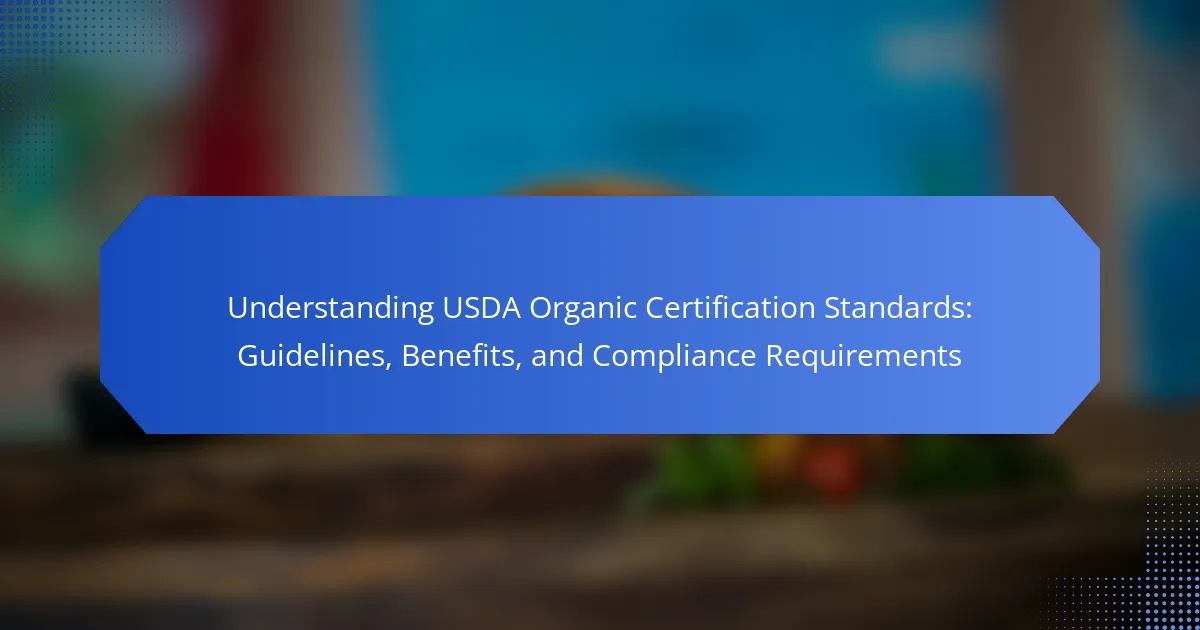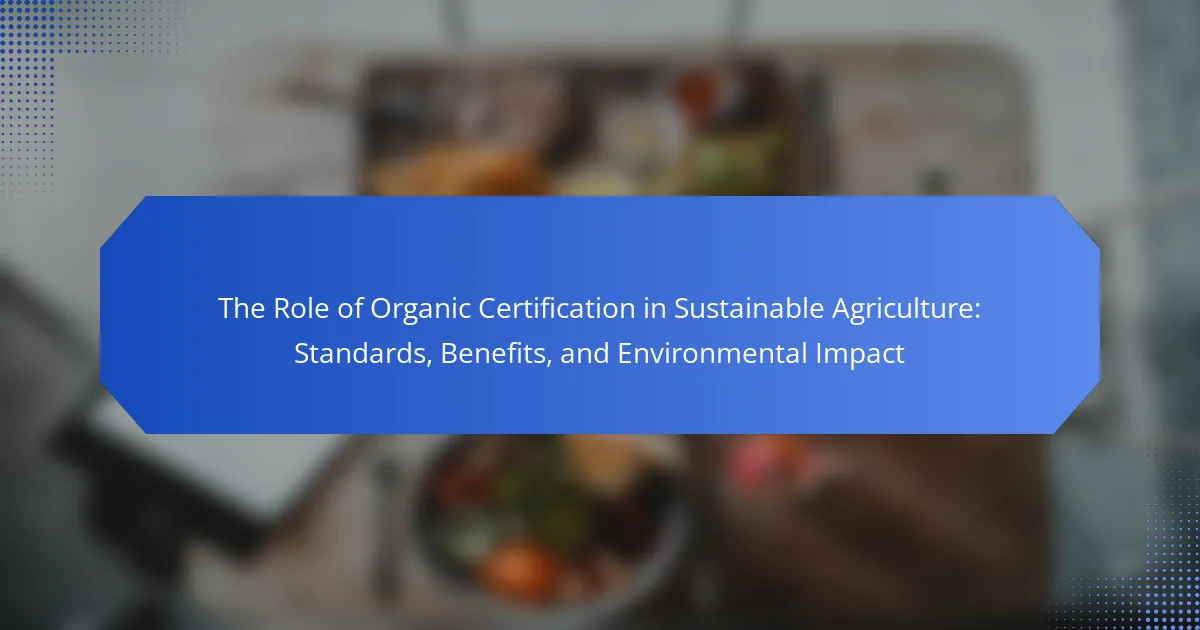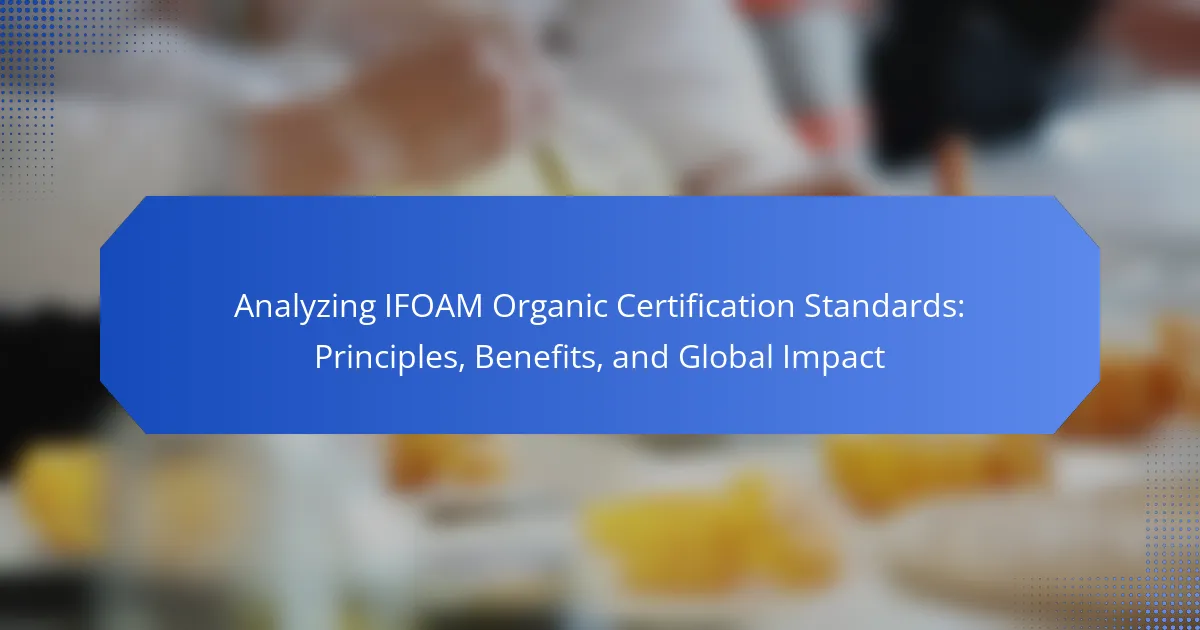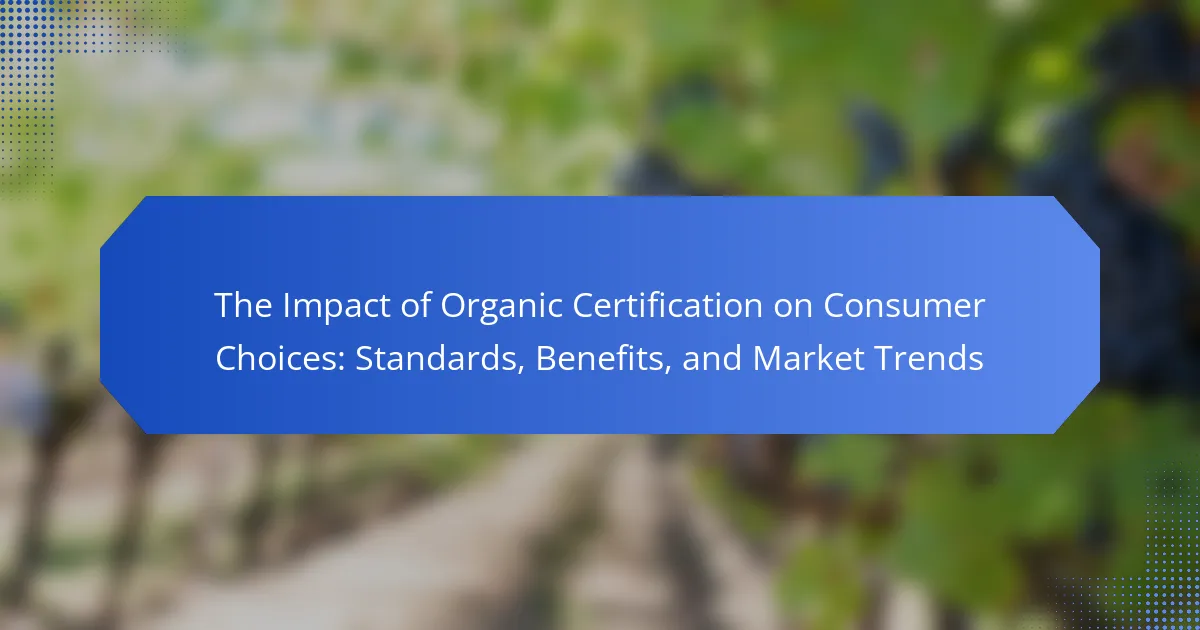Canada Organic Certification Standards are regulations established to ensure that organic products adhere to specific requirements set by the Canada Organic Regime. These standards govern the production, processing, and labeling of organic products, emphasizing the prohibition of synthetic pesticides and fertilizers, as well as the use of organic seeds and livestock. The certification process involves developing an organic production plan, undergoing a transition period, and passing an inspection by an accredited certifying body. Additionally, labeling guidelines mandate the inclusion of the Canada Organic logo and the identification of the certifying body, ensuring transparency and consumer trust in organic products. This comprehensive guide covers the certification process, benefits, and labeling requirements associated with Canada Organic Certification Standards.
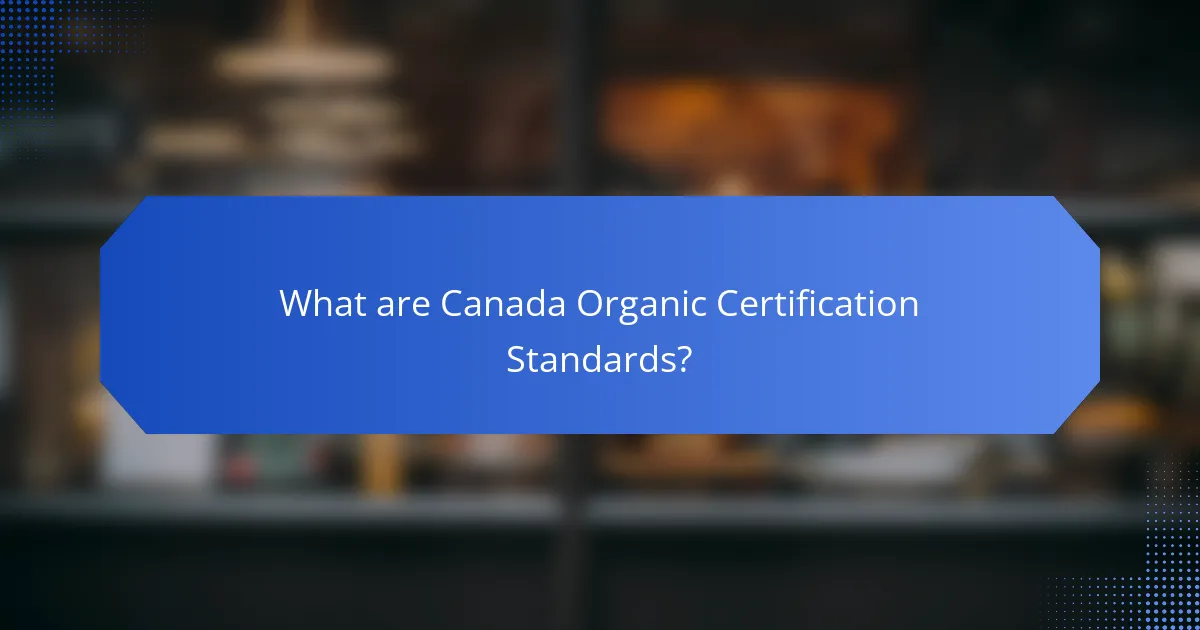
What are Canada Organic Certification Standards?
Canada Organic Certification Standards are regulations that ensure organic products meet specific requirements. These standards are governed by the Canada Organic Regime. They cover production, processing, and labeling of organic products. Compliance with these standards is verified through accredited certification bodies. The standards prohibit the use of synthetic pesticides and fertilizers. They also mandate the use of organic seeds and livestock. Organic farming practices must promote biodiversity and soil health. The standards are designed to protect consumers and promote sustainable agriculture.
How are organic standards defined in Canada?
Organic standards in Canada are defined by the Canada Organic Regime (COR). The COR establishes guidelines for organic production, processing, and labeling. These standards ensure that organic products meet specific criteria. The regulations are enforced by the Canadian Food Inspection Agency (CFIA). Compliance with these standards is mandatory for organic certification. The standards cover various aspects, including allowed substances and practices. They also emphasize sustainability and environmental stewardship. Overall, the COR aims to protect consumer trust and promote organic agriculture in Canada.
What are the key components of these organic standards?
The key components of organic standards in Canada include the prohibition of synthetic pesticides and fertilizers. These standards require the use of organic seeds and planting stock. They also mandate crop rotation to maintain soil health. Livestock must be raised without antibiotics and growth hormones. Additionally, organic standards stipulate access to outdoor space for animals. Record keeping and traceability of organic products are essential. Compliance with these standards is verified through inspections. These components ensure the integrity and sustainability of organic farming practices in Canada.
How do these standards ensure product integrity?
These standards ensure product integrity by establishing strict guidelines for organic farming and processing. They require adherence to specific practices that promote sustainability and environmental stewardship. Compliance with these standards is verified through regular inspections and audits. These assessments help maintain transparency in the supply chain. Additionally, certified organic products must meet stringent labeling requirements. This ensures consumers receive accurate information about the products they purchase. Studies show that adherence to these standards increases consumer trust in organic products. Therefore, these standards play a crucial role in maintaining the integrity of organic products in the market.
Why is organic certification important in Canada?
Organic certification is important in Canada because it ensures that agricultural products meet specific organic standards. These standards promote sustainable farming practices that enhance soil health and biodiversity. Consumers rely on organic certification to make informed choices about food quality and safety. In Canada, the Canada Organic Regime governs this certification process. This regime requires rigorous inspections and adherence to strict regulations. As a result, certified organic products can be trusted to be free from synthetic pesticides and genetically modified organisms. The organic market in Canada has seen significant growth, with sales reaching over $5 billion in recent years. This growth reflects increasing consumer demand for organic products.
What benefits does organic certification provide to consumers?
Organic certification provides consumers with assurance of product quality and safety. It guarantees that products are free from synthetic pesticides and fertilizers. Organic certification also ensures that no genetically modified organisms (GMOs) are present. Consumers benefit from better nutritional content in organic products. Research indicates that organic produce can have higher antioxidant levels. Additionally, organic farming practices promote environmental sustainability. This leads to healthier ecosystems and biodiversity. Lastly, organic certification fosters transparency in food sourcing. Consumers can make informed choices about the products they purchase.
How does organic certification impact farmers and producers?
Organic certification provides farmers and producers with access to premium markets. It enhances their product value by appealing to health-conscious consumers. Certified organic products often command higher prices compared to conventional goods. This can lead to increased profitability for farmers and producers. Additionally, organic certification can improve market competitiveness. It allows farmers to differentiate their products in a crowded marketplace. Studies show that organic farms can yield higher income levels than non-organic counterparts. For example, a study by the Organic Trade Association indicated that organic farmers earn 22% more on average. Overall, organic certification positively impacts the economic viability of farmers and producers.

What is the process for obtaining Canada Organic Certification?
The process for obtaining Canada Organic Certification involves several key steps. First, a producer must develop an organic production plan. This plan outlines the farming practices and inputs used. Next, the producer must implement the plan for a minimum of three years. This duration allows for the soil and crops to transition to organic standards.
After the transition period, the producer must choose a certifying body accredited by the Canadian Food Inspection Agency (CFIA). The chosen certifier will conduct an on-site inspection of the farm. This inspection verifies compliance with the Canada Organic Standards.
Following the inspection, the certifying body reviews the findings and decides on certification. If approved, the producer receives an organic certificate. This certificate must be renewed annually, requiring ongoing compliance with organic standards.
The CFIA oversees the entire certification process to ensure adherence to regulations. This structured approach ensures the integrity of organic products in Canada.
What steps are involved in the certification process?
The certification process for Canada Organic Certification involves several key steps. First, an applicant must submit an application to a certifying body. This includes providing detailed information about their farming practices and inputs. Second, the certifying body reviews the application for compliance with organic standards. Third, an on-site inspection is conducted to verify adherence to organic practices. Fourth, the certifying body evaluates the inspection report and makes a certification decision. If approved, the applicant receives their organic certificate. Finally, ongoing compliance is monitored through annual inspections and record-keeping requirements. These steps ensure that the organic certification process maintains integrity and quality standards.
How do applicants prepare for the certification process?
Applicants prepare for the certification process by thoroughly reviewing the Canada Organic Standards. They must understand the specific requirements for organic production, handling, and labeling. This includes familiarizing themselves with the permitted substances and practices. Applicants often conduct an internal audit of their operations to ensure compliance. They may also develop a detailed organic management plan. Documentation of practices and inputs is essential for transparency. Many applicants attend workshops or training sessions to gain insights into the certification process. Engaging with a certification body early can provide guidance and support throughout the preparation phase.
What documentation is required for certification?
Certification requires specific documentation to ensure compliance with organic standards. This documentation typically includes an organic system plan, which outlines farming practices and inputs. Records of inputs and outputs must also be maintained to demonstrate adherence to organic practices. Additionally, a history of land use is necessary to verify that the land has not been treated with prohibited substances. Inspection reports from a certified organic inspector are crucial for the evaluation process. Lastly, any relevant certificates from suppliers of organic inputs should be included to support claims of organic integrity.
How long does the certification process take?
The certification process typically takes between six months to two years. This duration depends on various factors, including the complexity of the operation and the completeness of the application. For instance, larger operations or those with multiple products may require more time for thorough inspections and documentation review. Additionally, the time frame can be influenced by the certifying body’s workload and the applicant’s responsiveness to requests for additional information. According to the Canadian Food Inspection Agency, timely submission of all required documentation can expedite the process.
What factors can influence the duration of the certification process?
The duration of the certification process can be influenced by several key factors. The complexity of the operation significantly impacts the timeline. Larger operations may require more extensive documentation and review. The completeness of the application also plays a critical role. Incomplete applications can lead to delays in processing. The availability of required documentation is another crucial factor. If documents are not readily available, it can prolong the process. Additionally, the responsiveness of the applicant affects the duration. Timely communication can expedite the review process. Finally, the workload of the certifying agency can influence timelines. High demand can lead to longer processing times.
How can applicants expedite the certification process?
Applicants can expedite the certification process by ensuring all documentation is complete and accurate. They should familiarize themselves with the specific requirements of the Canada Organic Certification Standards. Submitting all necessary forms and supporting documents in one package can reduce delays. Maintaining clear and organized records of organic practices will facilitate the review process. Engaging with a certification body early can provide guidance on requirements. Additionally, addressing any feedback from the certifying agency promptly can prevent setbacks. Many applicants find that consulting with experienced organic producers can provide valuable insights. These steps collectively enhance the efficiency of the certification process.
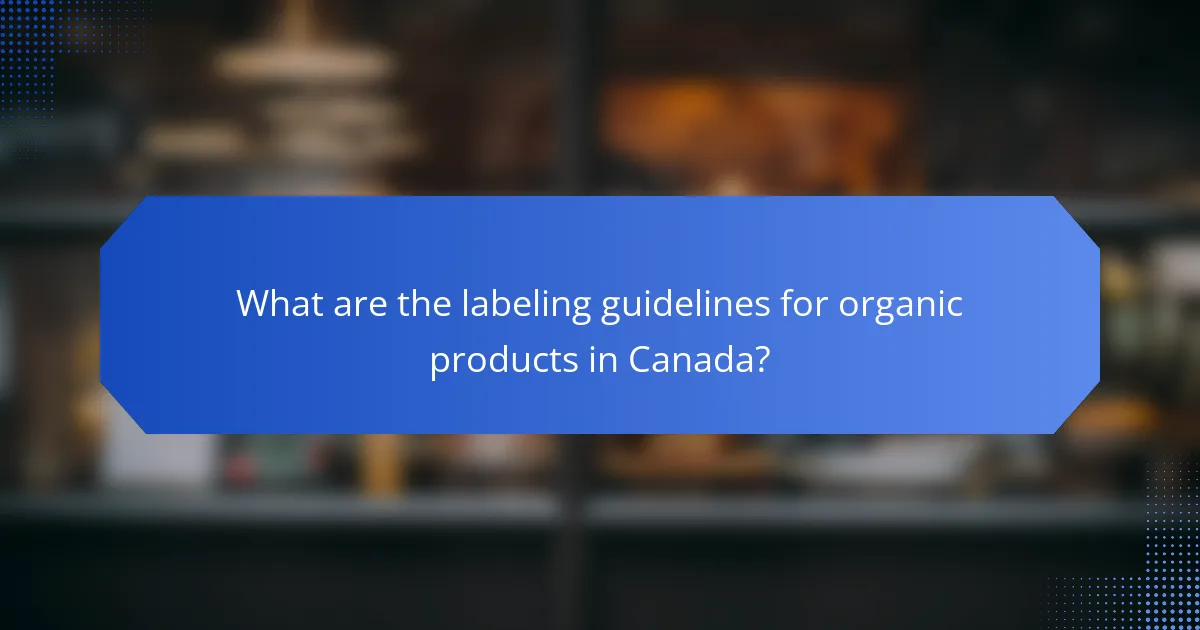
What are the labeling guidelines for organic products in Canada?
The labeling guidelines for organic products in Canada are defined by the Canada Organic Regime. Products must be certified organic to use the term “organic” on labels. The label must include the Canada Organic logo if the product is certified. Additionally, the label must identify the certifying body. Organic products must also list ingredients in descending order by weight. The label must not contain any misleading information. Non-organic ingredients must be clearly identified. These guidelines ensure transparency and consumer trust in organic labeling.
What information must be included on organic labels?
Organic labels must include specific information to ensure compliance with certification standards. This information typically consists of the organic certification logo, the name of the certifying body, and a list of ingredients. Additionally, labels should specify whether the product is 100% organic, organic, or made with organic ingredients. The country of origin must also be indicated. These details help consumers make informed choices about organic products. Compliance with these labeling requirements is mandated by the Canada Organic Regime, which regulates organic certification in Canada.
How do labeling requirements vary by product type?
Labeling requirements vary significantly by product type in Canada. Food products must display specific information such as ingredients, allergens, and nutritional facts. Non-food products, like cosmetics, require a list of ingredients and any applicable warnings. Organic products must clearly state their organic certification and contain the Canada Organic logo. The labeling for agricultural products includes details on the farming practices used. Additionally, each category has unique regulations enforced by different agencies, such as the Canadian Food Inspection Agency (CFIA) for food and Health Canada for cosmetics. Compliance with these requirements ensures transparency and consumer safety.
What symbols or logos indicate organic certification?
The symbols or logos that indicate organic certification include the Canada Organic logo and the USDA Organic seal. The Canada Organic logo features a green and white design with the word “Organic” prominently displayed. This logo signifies that products meet the Canada Organic Standards set by the Canadian Food Inspection Agency. The USDA Organic seal is a black and white emblem that indicates compliance with U.S. organic standards. Both logos assure consumers that the products have been produced without synthetic pesticides, fertilizers, or genetically modified organisms.
How do consumers interpret organic labels?
Consumers interpret organic labels as indicators of food products that meet specific agricultural standards. These labels often signify that the product is free from synthetic pesticides and fertilizers. Consumers associate organic labels with health benefits and environmental sustainability. Research shows that 76% of consumers believe organic foods are healthier than conventional options. Trust in organic labels is influenced by certification logos and transparency in sourcing. Consumers often seek information on farming practices behind the organic label. The perceived value of organic products can also be linked to higher prices. Overall, organic labels guide consumer choices towards perceived quality and ethical considerations.
What common misconceptions exist about organic labeling?
Common misconceptions about organic labeling include the belief that all organic products are pesticide-free. In reality, organic farming allows the use of certain natural pesticides. Another misconception is that organic foods are always healthier than conventional ones. Nutritional content can vary widely regardless of labeling. Some consumers think organic products are always locally sourced, but organic certification can apply to products imported from other countries. Additionally, there is a belief that organic labeling guarantees better animal welfare, which is not universally true as standards can vary. Misunderstanding the meaning of “100% organic,” “organic,” and “made with organic ingredients” also leads to confusion. These terms have specific definitions under Canadian organic standards, impacting consumer perceptions.
How can consumers verify the authenticity of organic products?
Consumers can verify the authenticity of organic products by checking for certification labels. In Canada, organic products must have a label indicating they are certified organic by a recognized body. This label ensures that the product meets the Canada Organic Regime standards. Consumers should look for the Canada Organic logo, which signifies compliance with these standards. Additionally, consumers can research the certifying agency to confirm its credibility. Each certified product should also have a unique certification number, allowing traceability back to the certifying organization. This process helps ensure transparency and accountability in organic farming practices.
What best practices should producers follow for organic certification?
Producers should follow several best practices for organic certification. First, they must comply with the Canada Organic Regime (COR) standards. This includes using organic seeds and inputs. Producers should maintain detailed records of all farming practices. Documentation must include inputs, harvests, and sales. Crop rotation and biodiversity are essential practices to enhance soil health. Producers should also implement pest management strategies that align with organic standards. Regular training and education on organic practices are crucial for compliance. Finally, producers must undergo annual inspections by a certified organic inspector to maintain their certification. These practices ensure adherence to organic standards and promote sustainable agriculture.
How can producers maintain compliance with organic standards?
Producers can maintain compliance with organic standards by following established regulations and practices. They must ensure that their farming methods adhere to the Canadian Organic Standards. This includes using organic seeds, avoiding synthetic pesticides and fertilizers, and implementing crop rotation. Record-keeping is essential for tracking inputs and practices. Regular inspections by certifying bodies are required to verify compliance. Producers should stay informed about updates to organic regulations. Training and education on organic practices help maintain standards. Compliance ensures the integrity of organic certification and consumer trust.
What resources are available to assist with the certification process?
Resources available to assist with the certification process include government websites, industry associations, and educational materials. The Canadian Food Inspection Agency (CFIA) provides guidelines and information on organic certification. Organizations like the Organic Council of Ontario offer resources and support for certification. Additionally, webinars and workshops are often available to educate applicants about the process. These resources help clarify requirements and provide step-by-step guidance for potential certifiers. Accessing these tools can significantly streamline the certification journey for organic producers in Canada.
Canada Organic Certification Standards are regulations ensuring that organic products comply with specific requirements for production, processing, and labeling, governed by the Canada Organic Regime. This article provides a comprehensive overview of these standards, detailing the certification process, key components, and the importance of organic certification for consumers and producers alike. It also covers labeling guidelines, the necessary documentation for certification, and best practices for maintaining compliance with organic standards. Through this guide, readers will gain insights into how organic certification promotes sustainability, consumer trust, and economic benefits for farmers in Canada.
